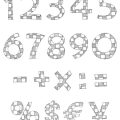Introduction to Astrological Compatibility in British Culture
Astrology, with its ancient origins and enduring allure, has long held a unique place within British society. The practice of interpreting the positions of celestial bodies to glean insights into personality and relationships can be traced back through centuries of British history, where it was once the domain of royal courts and learned scholars. Today, astrology continues to captivate people across the UK, evolving from its medieval roots to become a familiar part of daily life for many. In contemporary Britain, horoscopes appear in national newspapers and online magazines, while discussions about star signs and compatibility are common over tea or during friendly gatherings. This ongoing fascination speaks to both a respect for tradition and an openness to exploring personal connection in modern times. As we delve deeper into astrological compatibility, it is important to appreciate how this practice is woven into the cultural fabric of the UK—bridging past wisdom with present-day curiosity about love, friendship, and meaningful connection.
2. Core Elements of the Birth Chart: Sun, Moon, and Rising Signs
The astrological birth chart, or natal chart, is a symbolic map of the sky at the exact moment and place of your birth. In the UK, where our conversations often blend wit and understatement with a keen sense for personal nuance, understanding the essential elements of your birth chart can provide meaningful insights into both yourself and your relationships. The core trio—Sun sign, Moon sign, and Rising (or Ascendant) sign—form the foundation of any astrological analysis. Each plays a distinct role in shaping personality and compatibility.
Sun Sign: Your Essential Self
The Sun sign is what most Britons refer to when they read their horoscopes in papers like The Times or The Guardian. It represents your central character—your basic identity and how you express yourself in daily life. For example, a Taurus Sun might be steady, practical, and drawn to the comforts of home (think of someone who enjoys a well-brewed cup of tea and a good natter by the fire), while a Leo Sun might revel in social gatherings, bringing warmth and charisma wherever they go—much like a lively host at a Sunday roast.
Moon Sign: Inner Emotions
The Moon sign reveals your emotional landscape—how you instinctively react to situations and what makes you feel secure. British culture often values emotional reserve; however, understanding your Moon sign can help you navigate those deeper feelings that aren’t always discussed openly. For instance, a Cancer Moon may seek nurturing connections and cherish family traditions, while an Aquarius Moon might prefer intellectual stimulation over sentimental displays.
Rising Sign: Social Persona
Your Rising sign is how you present yourself to the world—the ‘first impression’ you give, much like meeting someone for the first time at a village fête or city pub. It colours your mannerisms and approach to new experiences. A Virgo Rising may come across as polite and attentive to detail (perhaps fussing over getting everyone’s order right at the chippy), while Sagittarius Rising could appear adventurous and open-minded from the outset.
Summary Table: Major Birth Chart Components
| Component | Role in Personality | Influence on Relationships | Typical British Example |
|---|---|---|---|
| Sun Sign | Core identity; willpower; ego | General compatibility; shared values | Taurus enjoys traditional Sunday lunch rituals |
| Moon Sign | Emotional needs; instinctive responses | Emotional connection; comfort level with others | Cancer finds solace in family gatherings around Christmas crackers |
| Rising Sign | Social mask; outward behaviour | First impressions; initial attraction | Libra Rising brings diplomatic charm to group outings at the local pub |
The Interplay for Compatibility
A harmonious relationship often involves complementary or compatible elements among these three signs. For example, two people sharing water Moons may intuitively understand each other’s emotional cues—akin to the unspoken camaraderie found between lifelong friends at a British seaside holiday. Recognising these influences helps foster empathy and mutual respect, providing a timeless framework for love and connection in everyday British life.

3. How the Houses Shape Relationships
In astrology, the twelve houses play a significant role in illuminating how individuals relate to one another, particularly in matters of love and partnership. Each house represents a distinct area of life, and their influence is subtly woven into the fabric of relationships across the UK, reflecting both personal inclinations and wider cultural values.
The Seventh House: Partnerships and Commitment
The seventh house is traditionally associated with marriage and long-term partnerships. In British culture, where understated commitment and loyalty are highly valued, this house reveals how one approaches lasting unions. A strong seventh house suggests a person who takes relationships seriously, favouring steady courtship over fleeting romance—a trait often admired within the UK’s social landscape.
The Fifth House: Romance and Courtship
The fifth house governs romance, pleasure, and creative self-expression. Its influence can be seen in how Britons express affection—often reserved but deeply heartfelt. Whether it’s through thoughtful gestures or shared cultural experiences like a cosy pub evening or a walk along the countryside, those with prominent fifth-house placements may find joy in traditional yet meaningful displays of love.
The Fourth House: Family and Roots
British values often emphasise a strong sense of home and heritage, aligning closely with the fourth house of family and roots. This house’s presence in synastry charts can indicate compatibility when partners share similar attitudes toward home life and familial ties—qualities that underpin many enduring British partnerships.
Manifestation in British Life
Astrological houses do not operate in isolation; they interact with each other, shaping unique relationship dynamics. In the UK context, where privacy is cherished and emotional expression may be subtle, these interactions help explain why some couples flourish quietly while others might struggle to bridge differences. Understanding the interplay of houses offers practical insight into navigating love’s complexities within British society, honouring tradition while embracing authentic connection.
4. Synastry: Comparing Two Charts for Love Compatibility
Synastry, often called the art of astrological chart comparison, holds a cherished place in British astrology circles. By laying two natal charts side by side—much like comparing the blueprints of two historic London townhouses—astrologers can discern where energies flow harmoniously or where friction may arise. This practice is particularly valued among couples across the UK, from the bustling streets of Manchester to the serene hills of the Cotswolds, as it helps illuminate why certain partnerships feel as comfortable as a well-worn Barbour jacket, while others resemble navigating the twists and turns of a Cornish lane on a rainy afternoon.
How Synastry Works
At its core, synastry focuses on planetary aspects between two charts. For example, if one partner’s Venus aligns with another’s Mars, there may be instant chemistry—akin to meeting someone over tea at a local café and feeling an immediate spark. Conversely, challenging aspects (such as Saturn square Moon) might suggest areas requiring patience and understanding, much like learning to appreciate each other’s favourite football teams or Sunday roast recipes.
Key Planetary Aspects in Synastry
| Aspect | Interpretation (UK Context) |
|---|---|
| Sun Conjunct Moon | A strong sense of unity and shared purpose—like two mates supporting the same cricket team. |
| Venus Trine Mars | Natural romantic attraction, reminiscent of a classic British love story set in the countryside. |
| Mercury Square Mercury | Differing communication styles; similar to regional dialects causing misunderstandings but also adding charm. |
| Saturn Opposite Sun | Tests and lessons in commitment, echoing the resilience required during a long British winter. |
Case Studies with a British Touch
Consider Sarah from Brighton and Tom from Newcastle. When their charts were compared, their Suns formed a harmonious trine—a sign of easy rapport and shared values. However, their Moons were in tension, reflecting differing emotional needs: Sarah preferred lively city nights while Tom sought quiet walks along the Tyne. Through synastry, they learned to bridge these differences by planning weekends that balanced both pursuits.
In another case, Emily from Cardiff and James from Edinburgh had Venus opposite Pluto—a passionate connection but with undercurrents of intensity. By understanding this aspect, they approached their relationship with greater honesty and respect for boundaries, ensuring their connection remained heartfelt rather than overwhelming.
In summary, synastry offers invaluable insights for those seeking meaningful connection in the UK’s rich tapestry of cultures and traditions. It encourages couples to embrace both harmony and difference—fostering relationships that are as enduring as Britain’s ancient stone circles.
5. Common Compatibility Combinations Among Brits
When considering astrological compatibility, certain star sign pairings tend to resonate strongly within British culture, reflecting both traditional values and modern romantic ideals. Many Britons find themselves drawn to combinations that echo familiar archetypes seen in beloved novels, television dramas, or even among public figures.
Taurus and Cancer is a classic pairing often associated with the warmth of a cosy countryside cottage—think of the steadfast reliability of Taurus blending beautifully with the nurturing heart of Cancer. This match is reminiscent of iconic couples from British literature, such as Elizabeth Bennet and Mr Darcy, where stability and emotional depth create lasting bonds.
Gemini and Libra, on the other hand, embody the social vibrancy found in Britain’s bustling cities. These air signs share a love for conversation and cultural outings—imagine two friends debating over tea at a London café or attending an art exhibition together. Their connection thrives on intellectual stimulation and shared aesthetic sensibilities.
Another frequently spotted duo is Leo and Sagittarius. Both fire signs, they reflect the adventurous spirit found along the rugged coastlines of Cornwall or during music festivals across the UK. This pairing is about mutual encouragement, laughter, and bold pursuits—qualities that appeal to those who embrace life’s grand adventures.
For those seeking steady partnership, Virgo and Capricorn are often highlighted in British astrology circles. Their practical approach to life echoes the famed British resolve and commitment to tradition. Together, they build strong foundations—whether that’s renovating a Victorian terrace or running a family business—that stand the test of time.
These popular combinations illustrate how astrological wisdom can intertwine with local customs and collective imagination in the UK. By recognising these familiar pairings, individuals can better appreciate how their own star sign connections might unfold amidst the unique tapestry of British love stories.
6. Astrological Guidance for Navigating Modern UK Relationships
Astrology, when viewed through a traditional and culturally sensitive lens, offers a time-honoured compass for guiding matters of the heart within the unique tapestry of contemporary British life. The United Kingdom, with its blend of rich heritage and evolving social norms, presents both challenges and opportunities for those seeking lasting love and meaningful connection. By weaving astrological wisdom into everyday romance, couples can nurture bonds that reflect both personal authenticity and respect for local customs.
Integrating Astrology into Daily Life
The foundation of harmonious relationships often lies in mutual understanding—a principle echoed in both British values and astrological teachings. For example, recognising a partner’s Sun sign traits may help decode emotional responses, while appreciating the subtleties of their Moon or Venus sign can foster gentleness during moments of misunderstanding. In a culture renowned for its understated communication and love of wit, astrology encourages partners to approach differences with empathy rather than confrontation.
Culturally Mindful Communication
In the UK, clear yet polite communication is cherished. Astrological insight suggests aligning conversations with Mercury’s placement in each person’s chart—helping couples choose words thoughtfully, respecting boundaries, and using humour to diffuse tension. Whether navigating disagreements over tea or negotiating shared responsibilities, astrology gently reminds partners to value both listening and speaking from the heart.
Creating Space for Individual Growth
Modern British relationships often prize individual autonomy alongside togetherness. Astrology honours this by illuminating areas where each partner may need solitude or encouragement to pursue personal goals—perhaps indicated by the positions of Mars or Saturn. Supporting one another’s aspirations not only strengthens trust but also ensures that love remains vibrant and unforced amid the demands of contemporary life.
Honouring Traditions While Embracing Change
Astrology teaches that every relationship is shaped by cycles—some rooted in tradition, others signalling new beginnings. As Britain embraces diversity and redefines what partnership means, astrological principles can help couples balance respect for family customs with openness to modern dynamics. Celebrating anniversaries under auspicious planetary transits or planning milestone conversations during harmonious aspects are ways to honour the past while building a future together.
A Gentle Guide for Lasting Love
Above all, astrology invites British couples to cultivate patience, compassion, and self-awareness as they journey through love’s ever-changing landscape. By consulting the stars—not as rigid fate but as gentle guidance—partners can deepen their connection while remaining true to themselves and each other. In doing so, they create relationships rooted in understanding, resilience, and a distinctly British sense of grace.


